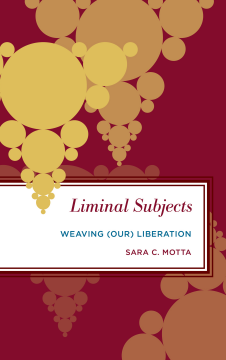
Additional Information
Book Details
Abstract
Through the stories of women in movement in the Americas, Europe and Australasia, this book explores a decolonising and feminised politics of liberation which is being weaved through the words and worlds of black, colonised and subaltern women. These stories demonstrate the complex and multiple forms of critique as practice that are being developed by women in movement in multiple sites of the Global South.
Written through story, prose, poetry, analysis and offering case-studies, methodologies, practices and generative questions the book expresses and contributes to the (co) creation of a new language of liberation. This is an enfleshed language in which there is a return of the world to the word, of the body to the text, and of the heart/womb to thought. This is a language of the political in which a new political subjectivity that is multiple, deeply relational and becoming is formed.
The book offers a window onto the complexities and depths of the wounding enacted by patriarchal capitalist coloniality through these stories but it also offers, through sharing and conceptualising prefigurative and dialogical co-creation of critique, the gift of practices of healing as emancipation, and the conditions of possibility for our collective liberation.
Sara Catherine Motta currently works in the Discipline of Politics at the University of Newcastle, NSW, Australia. She has published over 30 academic articles, edited 8 academic journal special issues since 2010, the most recent of which is (2017) Feminised Resistances with Tiina Seppälä for the Journal of Resistance Studies, and her most recent book is (2014) Constructing 21st Century Socialism in Latin America: The Role of Radical Education with Mike Cole (Palgrave Macmillan Press).
In line with the creative, theoretical, and critical projects of trailblazer women of color like Gloria Anzaldúa and Cherríe Moraga, and in conversation with an ample array of voices that include influential academics, activists, and artists, Sara Motta takes us through a path of reflection that is also a search for a decolonized voice, knowledge, praxis, spirituality, and selfhood. The text introduces the reader to provocative and insightful analyses that combine different currents of decolonial and anti-colonial thinking in different parts of the world. Motta also offers concepts and archetypes that promise to facilitate the connection between parts of the self and the world, as well as between the self, others, and the world, that have been torn apart by modernity/coloniality. This is a profound text and an important contribution to various forms of anti-colonial and decolonial feminisms as well as to decolonial and anti-racist thought at large.
Nelson Maldonado-Torres, Rutgers University
Lyrical, tough, eloquent, honest, generous, and, above all, wise. Sara Motta spells out the embodied material ground of our political struggles like no other. Here is a book to bring feminism back to its senses - a book that may even touch the hearts of men.
Ariel Salleh, Political Economy, University of Sydney, author of Ecofeminism as Politics
In her visionary, transformational book, Sara C. Motta risks the personal, birthing new-yet-ancient (ancestral) modes of knowing, being, and becoming that profoundly challenge conventional western epistemology, ontology, and metaphysics. Using poetry, prose, prayers, conversations, guided visualizations, ceremonies, rituals, case studies, and more, she offers a revolutionary, heretical alternative to modernity’s spirit phobia. Her embodied wor(l)ds demonstrate the generative power of multiplicity, interconnectivity, and the erotic. Liminal Subjects invites readers to fully embrace our enfleshed, trauma-inflected, bruised-yet-becoming-whole selves; listen with raw openness to our exiled inner and outer selves; access our bodies’ sacred wisdom; speak new stories into existence; and enact radical modes of decolonial love.
AnaLouise Keating, Professor and Director of the Multicultural Women's and Gender Studies Doctoral Program, Texas Woman's University
Table of Contents
| Section Title | Page | Action | Price |
|---|---|---|---|
| Contents | ix | ||
| List of Illustrations | xi | ||
| Acknowledgments | xiii | ||
| Part 1. SPEAKING FROM THE SILENCE(D) | 1 | ||
| Chapter 1. Untamable Women | 3 | ||
| Chapter 2. Silence | 23 | ||
| Part 2. BECOMING WOMAN | 41 | ||
| Chapter 3. Knowing (Our)Selves | 43 | ||
| Chapter 4. Our Serpents’ Tongues | 63 | ||
| Chapter 5. Sacred Erotics | 91 | ||
| Part 3. THE BLACK MOTHERS | 121 | ||
| Chapter 6. The Storyteller-Medicine Woman | 123 | ||
| Chapter 7. The Guardian-Gardener | 139 | ||
| Chapter 8. The Priestess-Shamanka | 157 | ||
| Part 4. HOMECOMING | 175 | ||
| Chapter 9. Liminal Subjects | 177 | ||
| Chapter 10. For You | 193 | ||
| Notes | 209 | ||
| References | 213 | ||
| Index | 223 | ||
| About the Author | 235 |
